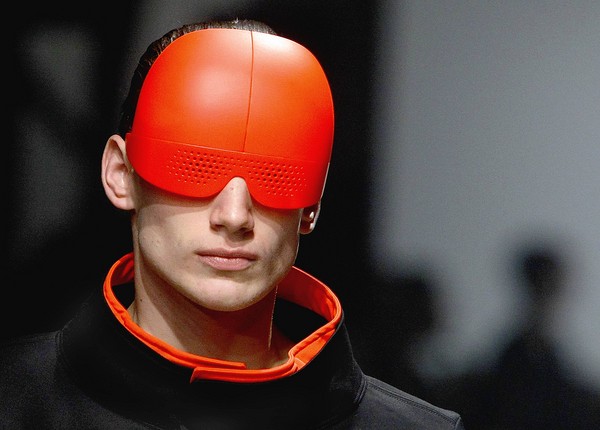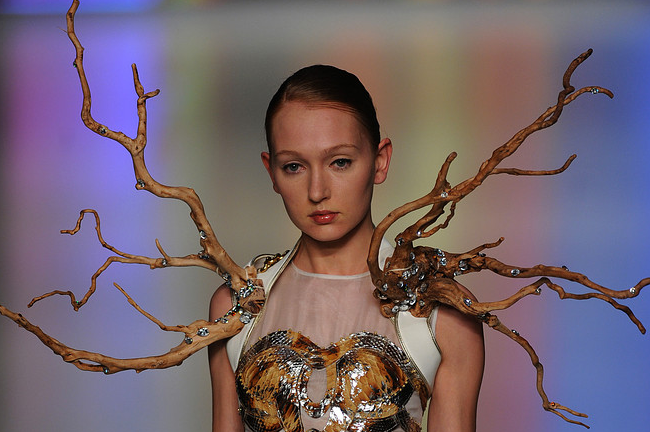Polarization seems to be the flavor of the year in Washington, cable networks are cashing in on polarized gender roles, and so there should be little surprise when encountering extremes during Fashion Week, where they never go out of style.

“Fashion Week” lasts for months, like a perpetual party of fin de siecle decadence on a yacht floating around the globe. Two recent shows, one in Paris and the other in Hong Kong, provided polarized examples of where humans might be at the end of this century.
According to one caption, the first photograph presents “creations” by French fashion designer Romain Kremer as part of his Men’s Fall Winter 2010-2011 fashion collection. I guess in the summer this cyborg would switch to something in aquamarine. Or perhaps the weather will no longer matter, although not for this creature:

This design by Mountain Yam at the Hong Kong show achieves one of the ends of art, which is to transform perception to see the potential in things. Here what we know to be part of the dress seems to be a natural part of the model herself, and so we can see one morphological possibility for a post-human species that has blended its genetic code with others. The first design did the same when it made the conjunction of human and machine (and within that, of the human body and the mechanical imitation of an insect eye) appear to be a perfect fit.
Side by side, the suggest two different paths: one toward a cyborg species where ordinary senses can be replaced by powerful electronic systems (or dispensed with for the same reason), and another where the human form returns to nature, part of a brachiated genetic ecosystem that intertwines species in organic harmony. If you think these two visions are merely my own strange extensions of the designer’s art, look at the background in each photo: in one, the dark tonality and structured designs of an industrialized urban scene; in the other, soft, pastel colors of a reorganized, blended spectrum of light.
By projecting forward, these creations also evoke ancient forms. The woman could be a Dryad, a tree nymph in Greek mythology, and the robotic figure in his institutional uniform evokes RoboCop, who channeled the Medieval armored knight whose faceplate reproduced the Greek helmet of antiquity. Even when trying to be highly unconventional, it is difficult to escape the pressure of cultural memory and symbolic form. Escape isn’t really the point, however, even when considering the post-human. Moving into that world will only reveal what was always available, both for good and for evil.
With that in mind, we might look again at the two faces above. They are merely models, of course, but both visions, however polarized they might be, seem to lead to the same docility. That could be a mere artifact of the fashion show, but it also might be thought of as one result, however ironic, of polarization.
Photographs by Jacques Brinon/Associated Press and Mike Clarke/AFP-Getty Images.
What?? Who wrote this? I can sum it up…it looks like crap like the majority of everything that walks down the runway. I’m not afraid to tell you the emperor has no clothes.